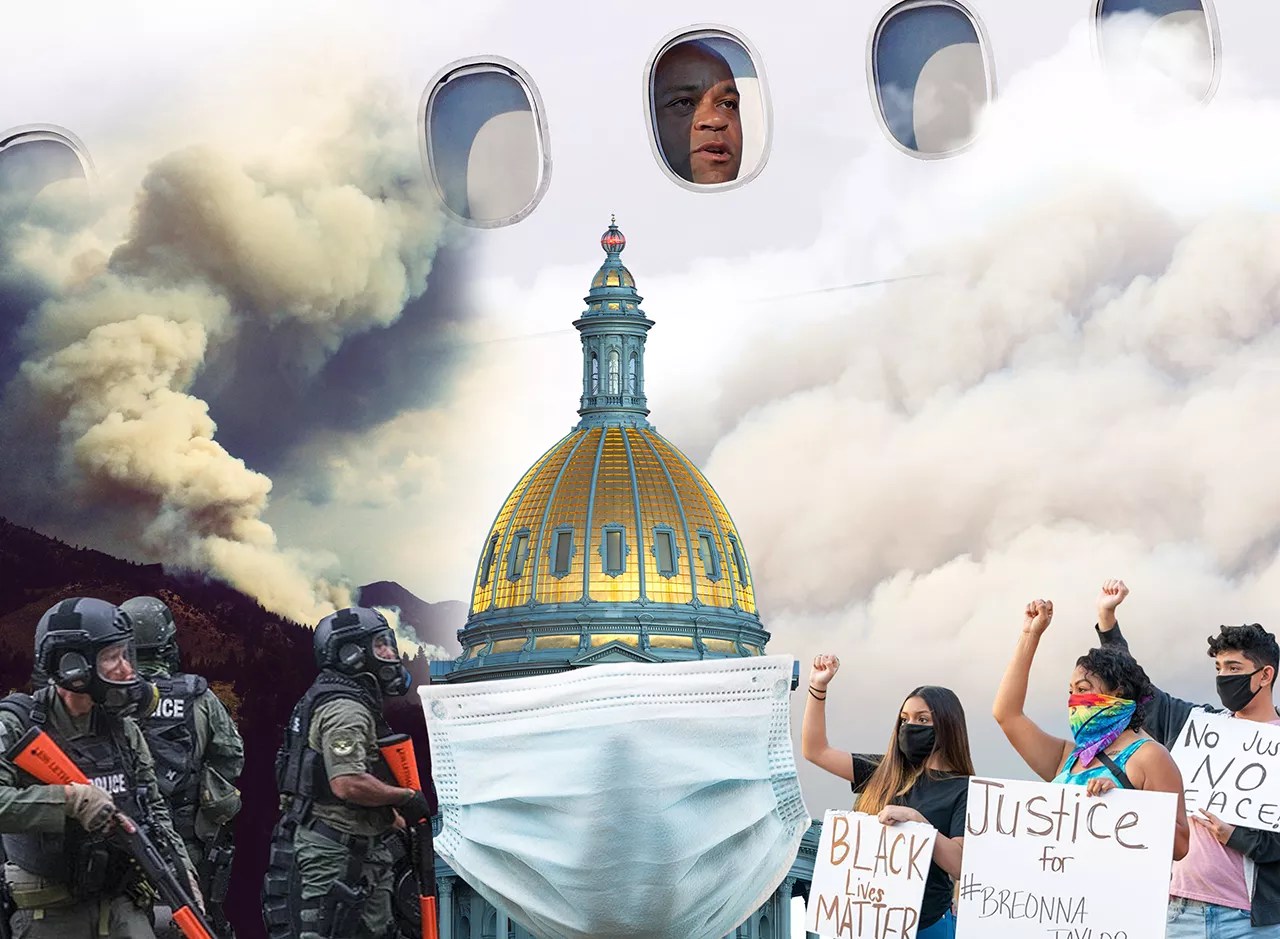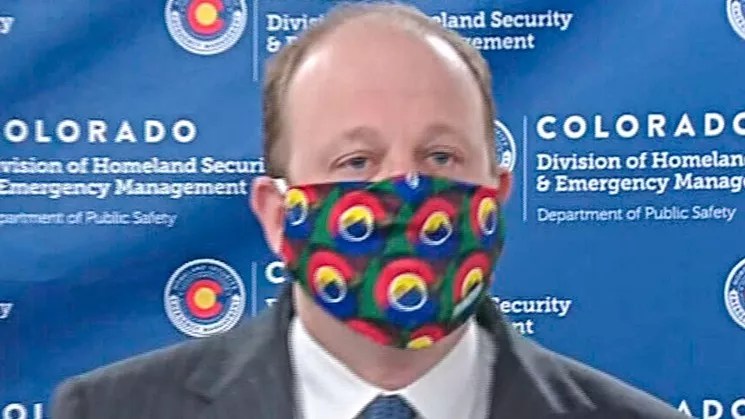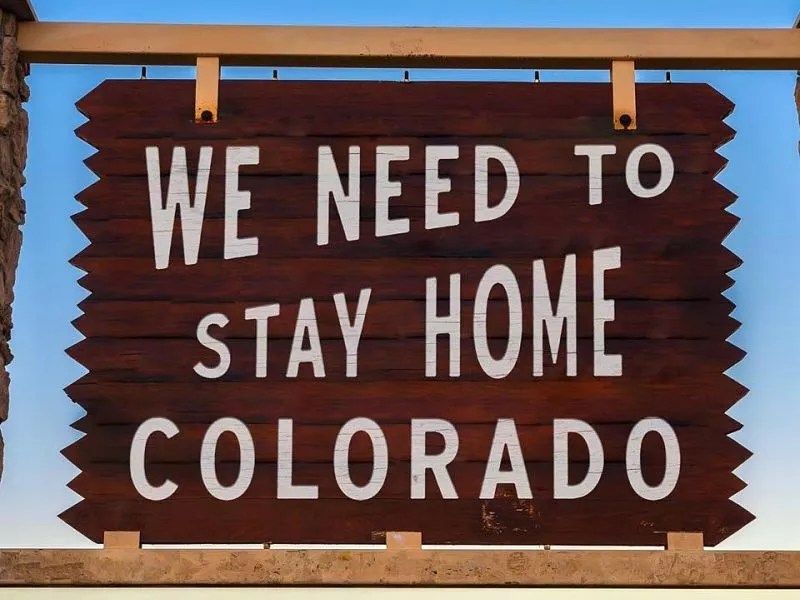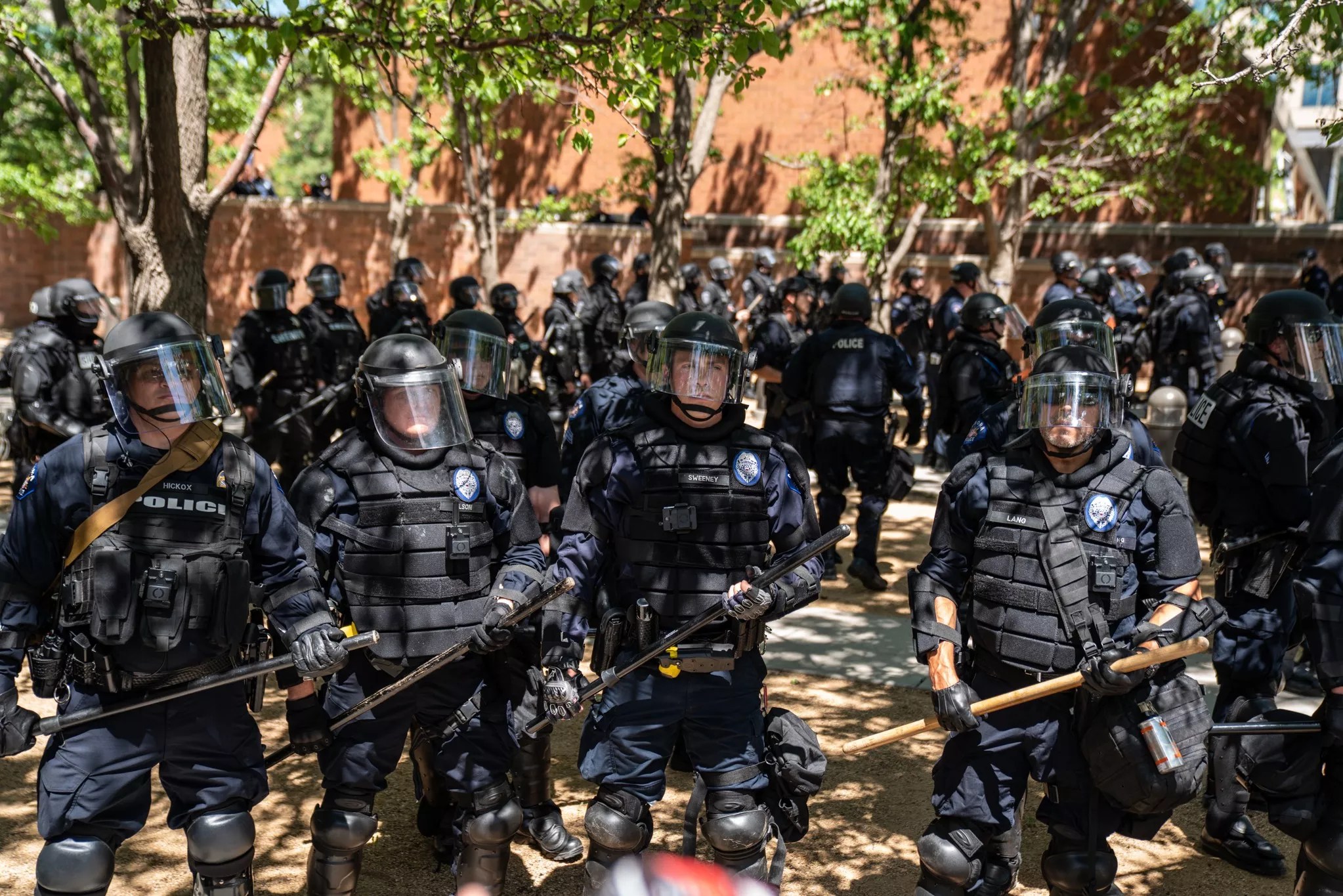
Westword photo illustration/Getty Images

Audio By Carbonatix
What a year! While 2020 got off to a promising start, with drop-ins by presidential candidates livening up the political scene, things took a real turn in March, when the coronavirus pandemic reached Colorado. After that, the realities of COVID-19 – from its crushing impact on human life to its crippling impact on budgets – colored every political issue in the state.
Here are the top ten political stories of the year in Colorado, no recount needed:

Governor Jared Polis urging everyone to wear masks.
Colorado.gov
The Pandemic
This has been a painful year for all Coloradans – and a challenging one for Governor Jared Polis, who set out to walk a narrow path between shutting down the state for maximum safety and allowing variances for maximum flexibility in aiding businesses and other organizations. As the state exits 2020, the numbers are looking slightly better in Colorado – and a lot better compared to much of the rest of the country. But there are some dreadful numbers, too: The state has lost thousands of lives to COVID-19, and massive revenue shortfalls on the local and state level will lead to strict cost-cutting measures in the months ahead.

Will Lauren Boebert be the face of Colorado Republicans?
Courtesy of Lauren Boebert
Lauren Boebert’s Rise
Although Coloradans overwhelmingly rejected Donald Trump in the 2020 presidential election, voters in the 3rd Congressional District elected a political newcomer who ran to the right of Scott Tipton, the incumbent Republican congressman whom Trump himself had endorsed. Short on detailed policy ideas but long on kooky conspiracies, Lauren Boebert, the pistol-packing restaurant owner who defeated Diane Mitsch Bush in the general election, is framing herself as the anti-AOC. She’s also got a shot at becoming the face of the Colorado Republican Party, which has been awash in losses lately.
Cory Gardner’s Fall
In the run-up to the 2016 election, Cory Gardner sounded like a Never Trumper. “I will not vote for Donald Trump,” said the Yuma Republican after Access Hollywood aired the “grab ’em by the pussy” audio. But it didn’t take long for Gardner to change his tune, and during Trump’s four years in office, he was a devoutly loyal ally of the president. Whether looking for support for the Brett Kavanaugh nomination or against the impeachment vote, Trump could always count on Gardner. And that stance made Gardner’s footing shaky: Former governor John Hickenlooper ended up crushing him in the U.S. Senate race.
Denver Metro Turning Blue
Not that long ago, a handful of the counties in metro Denver were either solidly Republican or slightly purple. In 2020, however, Douglas County was the only one of the seven metro counties in which a majority of the voters chose Donald Trump for president. Everywhere else, including in formerly safe Republican areas like Arapahoe County, voters came out in droves for Joe Biden. Even in Douglas County, the margin between Trump and Biden was just 7.2 percent in Trump’s favor, a steep decline from the 18.1 percent margin of victory that Trump achieved over Hillary Clinton in 2016. The big question going forward: Can these counties go true blue?

Governor Jared Polis urged people to stay put during the pandemic.
Governor Jared Polis Facebook
Urban/Rural Divide
Colorado’s urban/rural divide was on full display this past November when a slight majority of the state’s residents voted in favor of a ballot initiative to reintroduce gray wolves to the western part of the state. Counties in the metro area all approved the measure; two-thirds of Boulder County residents gave the nod. But the majority of counties along the Western Slope voted against the initiative, concerned by the threat wolves could pose to livestock. State Senator Bob Rankin, a Republican who represents a large swath of northwest Colorado, even threatened to introduce a bill in the Colorado Legislature that would require the introduction of wolves in metro Denver…and definitely Boulder.
Coloradans Splitting on Ballot Initiatives
Colorado’s 2020 ballot was packed with initiatives that Coloradans considered in a highly nuanced manner. Voters said yes to repealing the Gallagher Amendment, an action that will likely lead to an increase in residential property taxes, but also removed obstacles for rural communities looking to fund fire departments and other critical services. They also said yes to tax increases for nicotine products and for establishing paid family medical leave. At the same time, voters approved a measure that essentially creates a Taxpayer Bill of Rights for fees, which closes a legislative loophole. And Coloradans also decided to decrease the state tax rate from 4.63 percent to 4.55 percent. In other words, the state’s voters were all over the map this year.
SB-217
As Coloradans took to the streets of Denver and other cities across the state following the killing of George Floyd, one of the loudest cries heard around the state was for law enforcement accountability….and lawmakers clearly listened closely. Back in session in June, the Colorado Legislature passed a comprehensive law enforcement reform and accountability package, SB-217, which was quickly signed into law by Governor Jared Polis. The new law got rid of qualified immunity for excessive-force cases involving law enforcement officers, which has often prevented victims from remedying their complaints in court; it also dumped the fleeing-felon law, which gave police significant leeway in justifying shooting at an armed crime suspect running away. And it also required that body-worn cameras be implemented by law enforcement agencies across the state.
Death Penalty Repeal
In 2020, after years of advocates pushing for abolition, the Colorado Legislature finally voted to repeal the death penalty, making Colorado the 22nd state to do so. The vote didn’t fall neatly along party lines. Some Republican lawmakers voted in favor of repeal, while Democratic legislators, most notably Senator Rhonda Fields and Representative Tom Sullivan, both of whom have very personal connections to the death penalty, voted against it. Not long after signing the repeal bill into law, Governor Jared Polis commuted the sentences of the three men on Colorado’s death row to life in prison without parole.

Aurora officers in riot gear at a June 27 protest over the death of Elijah McClain.
Michael Emery Hecker
Colorado’s Most Interesting City
Aurora is Colorado’s most diverse city, and it’s rapidly becoming its most politically interesting. The state’s third-largest city is home to its largest refugee population – and also the ICE detention center run by GEO Group. While the mayor is former Congressman Mike Coffman, a Republican, Democrats have a plurality on the Aurora City Council for the first time in God knows how long (maybe ever), and while their efforts to pass a minimum-wage increase or gain protections for undocumented immigrants have been largely ineffective, they’ve stirred up plenty of rancor. And then there’s the endlessly bungled response to the death of Elijah McClain, from investigators with conflicts of interest to shameless selfies to spraying a violin vigil with tear gas, all of which kept Aurora in the news for all the wrong reasons.
An Uncivil Society
Colorado wasn’t alone in discovering that the fight over face coverings masked a very divided population. Even so, the fights in this state became very personal, with anti-maskers taking on fully covered citizens in supermarket aisles and on street corners. We may not be able to get along, but in 2021, can Coloradans at least be civil?